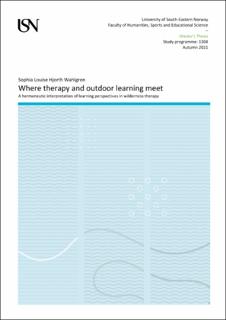Where therapy and outdoor learning meet - a hermeneutic interpretation of learning perspectives in wilderness therapy
Master thesis

Permanent lenke
https://hdl.handle.net/11250/2831099Utgivelsesdato
2021Metadata
Vis full innførselSamlinger
Sammendrag
This master’s thesis examines the learning processes in wilderness therapy practices in a European context. This group-based treatment modality for adolescents takes place in remote nature and combines psychotherapy with experiential learning, nature experience and basic outdoor skills.
Method: The thesis builds on four qualitative in-depth interviews with wilderness and adventure therapy therapists in Spain and Norway. Before conducting the interviews, participant observations were carried out on two-week-long wilderness therapy programmes, which provided a fundamental understanding of the context. The methodical approach is based on Gadamer’s philosophical hermeneutics, where interpretation and understanding are inseparable from the context. To interpret the empirical data, thematic analysis is used to form overall themes.
Theoretical perspectives: Illeris’ comprehensive learning theory, Lave and Wenger’s situated learning theories, and Tordsson’s perspective on outdoor learning are applied to interpret the generated themes.
The interpretation generated five themes: 1) The participants’ learning process; 2) facilitation of learning; 3) the therapists’ learning process; 4) nature’s role; and 5) a theme about the therapists’ characteristics. The interpretation shows that the situatedness and relations between the therapists, participants and nature are fundamental for the learning processes in wilderness therapy. Being together in nature over time develops an authentic and relatively equal relationship between the therapists and participants. The participants learn from and with their peers through holistic interactions. Nature provides situations where the participants can experience themselves in new ways and experience more profound and broader feelings. Combined with the in situ group conversations and reflections, it results in meaningful learning. Programmes and learning processes differ in relation to their socio-cultural situatedness.
Wilderness therapy has generally been related to the field of psychology. This research supports that the therapists are indispensable due to the target group, but it also suggests an integration of outdoor learning professionals to provide pedagogical perspectives and intentional facilitation of nature experiences. Interdisciplinary cooperation is proposed as the future development of wilderness therapy practices in Europe. This master’s thesis examines the learning processes in wilderness therapy practices in a European context. This group-based treatment modality for adolescents takes place in remote nature and combines psychotherapy with experiential learning, nature experience and basic outdoor skills.
Method: The thesis builds on four qualitative in-depth interviews with wilderness and adventure therapy therapists in Spain and Norway. Before conducting the interviews, participant observations were carried out on two-week-long wilderness therapy programmes, which provided a fundamental understanding of the context. The methodical approach is based on Gadamer’s philosophical hermeneutics, where interpretation and understanding are inseparable from the context. To interpret the empirical data, thematic analysis is used to form overall themes.
Theoretical perspectives: Illeris’ comprehensive learning theory, Lave and Wenger’s situated learning theories, and Tordsson’s perspective on outdoor learning are applied to interpret the generated themes.
The interpretation generated five themes: 1) The participants’ learning process; 2) facilitation of learning; 3) the therapists’ learning process; 4) nature’s role; and 5) a theme about the therapists’ characteristics. The interpretation shows that the situatedness and relations between the therapists, participants and nature are fundamental for the learning processes in wilderness therapy. Being together in nature over time develops an authentic and relatively equal relationship between the therapists and participants. The participants learn from and with their peers through holistic interactions. Nature provides situations where the participants can experience themselves in new ways and experience more profound and broader feelings. Combined with the in situ group conversations and reflections, it results in meaningful learning. Programmes and learning processes differ in relation to their socio-cultural situatedness.
Wilderness therapy has generally been related to the field of psychology. This research supports that the therapists are indispensable due to the target group, but it also suggests an integration of outdoor learning professionals to provide pedagogical perspectives and intentional facilitation of nature experiences. Interdisciplinary cooperation is proposed as the future development of wilderness therapy practices in Europe.